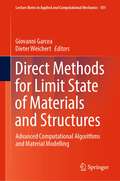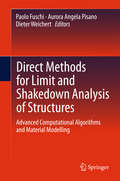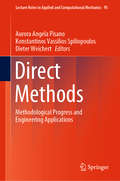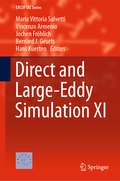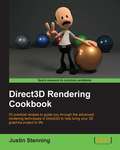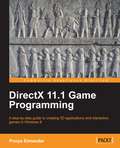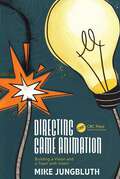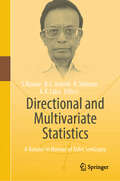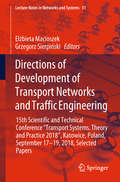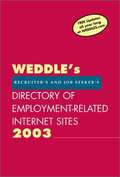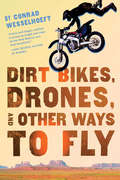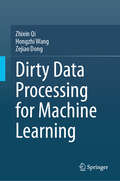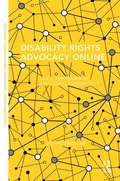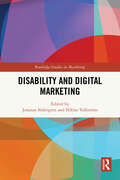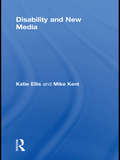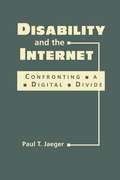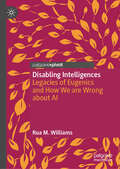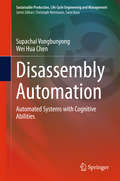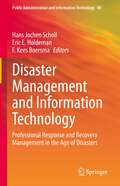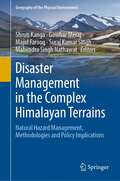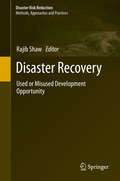- Table View
- List View
Direct Hit!
by Caroline Margaret SutherlandShe's a well-known author. He's a handsome, educated medical professional. How does a storybook romance turn into a Facebook nightmare of shattered trust, defamation, and even identity theft?Direct Hit! How Facebook Destroyed My Marriage and How I Healed is a harrowing account of what can and does happen on Facebook and other social media sites with alarming regularity. When Caroline Sutherland made the shocking discovery that her husband was romancing other women on Facebook-using her online profile-she didn't know that that was just the tip of the iceberg. In this riveting exposé, she charts the steps she took to uncover his criminal activities online and the legal channels she followed to seek justice.As inspiring as it is page-turning, this book is a wake-up call for readers who wonder what their spouses are really doing on the Internet. Sutherland offers straight talk about the uses and misuses of social media, practical ways for families to stay safe on Facebook, and the spiritual wisdom that can lead to healing after a betrayal of epic proportions.
Direct Methods for Limit State of Materials and Structures: Advanced Computational Algorithms and Material Modelling (Lecture Notes in Applied and Computational Mechanics #101)
by Dieter Weichert Giovanni GarceaThis book provides an overview of direct methods, such as limit and shakedown analysis, which are intended for avoiding cumbersome step-by-step calculations to determine the limit states of mechanical structures under monotone, cyclic or variable actions with unknown loading history. The book comprises several contributions that demonstrate how tremendous advances in numerical methods, especially in optimization, have contributed to the success of direct methods and their applicability to practical engineering problems in structural mechanics and mechanics of materials. The contents reflect the outcomes of the workshop “Direct Methods for Limit State of Materials and Structures,” held in Cosenza, Italy in June 2022.
Direct Methods for Limit States in Structures and Materials
by Konstantinos Spiliopoulos Dieter WeichertKnowing the safety factor for limit states such as plastic collapse, low cycle fatigue or ratcheting is always a major design consideration for civil and mechanical engineering structures that are subjected to loads. Direct methods of limit or shakedown analysis that proceed to directly find the limit states offer a better alternative than exact time-stepping calculations as, on one hand, an exact loading history is scarcely known, and on the other they are much less time-consuming. This book presents the state of the art on various topics concerning these methods, such as theoretical advances in limit and shakedown analysis, the development of relevant algorithms and computational procedures, sophisticated modeling of inelastic material behavior like hardening, non-associated flow rules, material damage and fatigue, contact and friction, homogenization and composites.
Direct Methods for Limit and Shakedown Analysis of Structures
by Dieter Weichert Paolo Fuschi Aurora Angela PisanoArticles in this book examine various materials and how to determine directly the limit state of a structure, in the sense of limit analysis and shakedown analysis. Apart from classical applications in mechanical and civil engineering contexts, the book reports on the emerging field of material design beyond the elastic limit, which has further industrial design and technological applications. Readers will discover that "Direct Methods" and the techniques presented here can in fact be used to numerically estimate the strength of structured materials such as composites or nano-materials, which represent fruitful fields of future applications. Leading researchers outline the latest computational tools and optimization techniques and explore the possibility of obtaining information on the limit state of a structure whose post-elastic loading path and constitutive behavior are not well defined or well known. Readers will discover how Direct Methods allow rapid and direct access to requested information in mathematically constructive manners without cumbersome step-by-step computation. Both researchers already interested or involved in the field and practical engineers who want to have a panorama of modern methods for structural safety assessment will find this book valuable. It provides the reader with the latest developments and a significant amount of references on the topic.
Direct Methods: Methodological Progress and Engineering Applications (Lecture Notes in Applied and Computational Mechanics #95)
by Dieter Weichert Aurora Angela Pisano Konstantinos Vassilios SpiliopoulosThis book provides an overview of direct methods such as limit and shakedown analysis, which are intended to do away with the need for cumbersome step-by-step calculations and determine the loading limits of mechanical structures under monotone, cyclic or variable loading with unknown loading history. The respective contributions demonstrate how tremendous advances in numerical methods, especially in optimization, have contributed to the success of direct methods and their practical applicability to engineering problems in structural mechanics, pavement and general soil mechanics, as well as the design of composite materials. The content reflects the outcomes of the workshop “Direct Methods: Methodological Progress and Engineering Applications,” which was offered as a mini-symposium of PCM-CMM 2019, held in Cracow, Poland in September 2019.
Direct and Large-Eddy Simulation XI (ERCOFTAC #25)
by Jochen Fröhlich Hans Kuerten Bernard J. Geurts Vincenzo Armenio Maria Vittoria Salvetti<p>This book gathers the proceedings of the 11th workshop on Direct and Large Eddy Simulation (DLES), which was held in Pisa, Italy in May 2017. The event focused on modern techniques for simulating turbulent flows based on the partial or full resolution of the instantaneous turbulent flow structures, as Direct Numerical Simulation (DNS), Large-Eddy Simulation (LES) or hybrid models based on a combination of LES and RANS approaches. In light of the growing capacities of modern computers, these approaches have been gaining more and more interest over the years and will undoubtedly be developed and applied further. The workshop offered a unique opportunity to establish a state-of-the-art of DNS, LES and related techniques for the computation and modeling of turbulent and transitional flows and to discuss about recent advances and applications. <p>This volume contains most of the contributed papers, which were submitted and further reviewed for publication. They cover advances in computational techniques, SGS modeling, boundary conditions, post-processing and data analysis, and applications in several fields, namely multiphase and reactive flows, convection and heat transfer, compressible flows, aerodynamics of airfoils and wings, bluff-body and separated flows, internal flows and wall turbulence and other complex flows. </p>
Direct3D Rendering Cookbook
by Justin StenningThis is a practical cookbook that dives into the various methods of programming graphics with a focus on games. It is a perfect package of all the innovative and up-to-date 3D rendering techniques supported by numerous illustrations, strong sample code, and concise explanations. Direct3D Rendering Cookbook is for C# .NET developers who want to learn the advanced rendering techniques made possible with DirectX 11.2. It is expected that the reader has at least a cursory knowledge of graphics programming, and although some knowledge of Direct3D 10+ is helpful, it is not necessary. An understanding of vector and matrix algebra is required.
DirectX 11.1 Game Programming
by Pooya EimandarWritten in step-by-step tutorial format, we will explore the creation of 3D applications and games through the development of a Windows 8 metro style game.DirectX 11.1 Game Programming Written for developers with knowledge of C++ essentails and 3D mathematics who would want to create metro style game on the Windows 8 platform.DirectX 11.1 Game Programming explores Direct3D 11.1 and Microsoft C++ component extensions along with introducing C++ accelerated massive parallelism.
Directing Game Animation: Building a Vision and a Team with Intent
by Mike JungbluthThe best character animation has a strong creative intent, driving a compelling performance. With the addition of interactivity, game animation adds complexity to the craft of how best to balance art, design and technology to realize a character’s performance. As a director, you are responsible for not only defining a vision for how those should balance but also being a leader, mentor and advocate for your team. But in a field of rapid iteration of ideas and techniques, that strong creative intent can be easily lost or sacrificed if not properly fostered and defined.Directing Game Animation: Building a Vision and a Team with Intent breaks down the process of creating an intentional animation vision that can be both unique and flexible. From defining the high-level experience to breaking down tech needs, projecting a team size and empowering everyone to work together, this book will help you to wrap your mind around a project’s animation needs.Animation, like every part of a game, cannot succeed—let alone function—in a vacuum. This book looks to foster a discussion around the process, needs and benefits of an empowered animation team and its vision as a universal benefit for the entire industry.This book is a guide to answer some of the most common questions people encounter when engaging with the overlap between creative and project leadership. What is your role? Learn how to establish expectations and needs specific to the project and team. How do you establish a vision? Learn how to better define and communicate creative topics such as a cohesive character performance and animation style. How do you build a team? Learn how to establish early on the team structure, skills and workflows needed to deliver on the needs of the project. How do you balance creative and production needs? Learn how to define quality, reviews and approvals in a way that empowers creativity and decision-making.
Directing for Animation: Everything You Didn't Learn in Art School
by Tony BancroftThere’s no class in art school that can teach you this. Believe it or not, there’s a lot more to directing a great animated film than beautiful illustrations and cool characters. You need to bring out your inner creative visionary and take your savvy leadership skills to the front lines - being great with a pencil, brush, or stylus is not enough. Tony Bancroft released his inner creative visionary when creating Mulan. In Directing for Animation he shows you exactly how. Pull the right strings to bring your characters to life and center your story by developing the visual cues that lend to your audiences understanding of the plot, place, and purpose. Tony walks you through the process, bringing you behind the scenes of real, well-known projects - with a little help from some famous friends. Learn from the directors of Aladdin, The Little Mermaid, Ice Age, Chicken Run, and Kung Fu Panda, and see how they developed stories and created characters that have endured for generations. Get the inside scoop behind these major features…pitfalls and all.
Directing the Story: Professional Storytelling and Storyboarding Techniques for Live Action and Animation
by Francis GlebasFrancis Glebas, a top Disney storyboard artist, shows how to reach the ultimate goal of animation and moviemaking by showing how to provide audiences with an emotionally satisfying experience. Directing the Story offers a structural approach to clearly and dramatically presenting visual stories. With Francis' help you'll discover the professional storytelling techniques which have swept away generations of movie goers and kept them coming back for more. You'll also learn to spot potential problems before they cost you time or money and offers creative solutions to solve them.Best of all, it practices what it preaches, using a graphic novel format to demonstrate the professional visual storytelling techniques you need to know.
Directional and Multivariate Statistics: A Volume in Honour of Ashis SenGupta
by Barry C. Arnold Arnab Kumar Laha Somesh Kumar Kunio ShimizuThis book contains select chapters on a range of topics in directional statistics, multivariate statistical inference, financial statistics, statistical machine learning and reliability inference. At the 43rd Annual Convention of the Indian Society for Probability and Statistics (ISPS) held in Prayagraj (formerly Allahabad), Uttar Pradesh, India, from 6–8 February 2024, attribute was paid to Prof. Ashis SenGupta on the occasion of his 70th birthday. He has pioneered research on directional statistics in the modern era in India and enhanced it worldwide and contributed significantly to the advancement of the following topics: Highly flexible distributions on manifolds Statistical machine learning in data science Big data on manifolds Optimal multiparameter, multivariate statistical inference Reliability inference and stress-dependent-strength models Directional statistics for highly volatile financial models Cylindrical, spherical and toroidal regression analysis Innovative applications of emerging real-life directional data
Directions of Development of Transport Networks and Traffic Engineering: 15th Scientific And Technical Conference Transport Systems. Theory And Practice 2018 , Katowice, Poland, September 17-19, 2018, Selected Papers (Lecture Notes in Networks and Systems #51)
by Elżbieta Macioszek Grzegorz SierpińskiThis book offers a collection of valuable guidelines for making decisions concerning the future development of transport networks and traffic engineering. The decision-making support systems described here will certainly attract the interest of those who face the challenge of finding solutions to problems concerning modern transport systems on a daily basis. Consequently, the book is chiefly intended for local authorities involved in planning and preparing development strategies for specific transport-related areas (in both urban and regional contexts), as well as for representatives of business and industry who are directly engaged in the implementation of traffic engineering solutions. The guidelines provided in the respective chapters help to address the given problem soundly, and to simplify the selection of an appropriate strategy. The topics covered include increasing the competitiveness of public transport, the status quo of electric vehicle infrastructures worldwide, methods for calming urban traffic as an element of sustainable transport development, speed traffic zones and electric buses, car-sharing systems in Poland, a method for deconstructing the regional travel demand model, monitoring urban traffic using floating car data, problems of deliveries in urban agglomeration distribution systems, estimating the number of threatened people in case of fire in road tunnels, and road pavement evaluation using advanced tools. Since the book also considers new approaches to theoretical models (including traffic flow surveys and measurements, transport behaviors, human factors in traffic engineering, and road condition modeling), it will also appeal to researchers and scientists studying these problems. The book gathers selected papers presented at the 15th Scientific and Technical Conference “Transport Systems. Theory and Practice”, organized by the Department of Transport Systems and Traffic Engineering, Silesian University of Technology in Katowice, Poland on September 17–19, 2018.
Directory of Employment-Related Internet Sites
by Peter D. WeddleThere are over 40,000 employment-related sites currently operating on the Internet. These job boards, resume databanks and career portals can give you a powerful advantage in the search for talent and in finding a new or better job. How can you take best advantage of these resources? Whether you're a job seeker or career activist, a recruiter or HR professional, the key to success is smart shopping-picking the right site for your particular situation and location. But to shop smart online, you need to know your options. And that's where WEDDLE's 2003 Directory of Employment-Related Internet Sites comes in! It is the most comprehensive and up-to-date listing of these sites in print, and it's been completely updated for 2003. In WEDDLE's Directory, you'll find over 6,000 sites organized in three categories: * Career field (e.g., sales and marketing, finance and accounting, human resources, engineering). * Industry (e.g., healthcare, banking, construction, insurance). * Location (including every state in the Union and more than 25 countries). All you have to do is find the category of interest to you, and "let your mouse do the clicking!" Each site is listed by name and its address (also called its Universal Resource Locator or URL) on the Internet. That way, you can find just the right sites for you, quickly and easily.
Dirt Bikes, Drones, and Other Ways to Fly
by Conrad WesselhoeftSeventeen year-old dirt-bike-riding daredevil Arlo Santiago catches the eye of the U.S. military with his first-place ranking on a video game featuring drone warfare, and must reconcile the work they want him to do with the emotional scars he has suffered following a violent death in his family. Adios, Nirvana author Conrad Wesselhoeft, takes readers from the skies over war-torn Pakistan to the dusty arroyos of New Mexico's outback in this young adult novel about daring to live in the wake of unbearable loss.
Dirty Data Processing for Machine Learning
by Hongzhi Wang Zhixin Qi Zejiao DongIn both the database and machine learning communities, data quality has become a serious issue which cannot be ignored. In this context, we refer to data with quality problems as “dirty data.” Clearly, for a given data mining or machine learning task, dirty data in both training and test datasets can affect the accuracy of results. Accordingly, this book analyzes the impacts of dirty data and explores effective methods for dirty data processing. Although existing data cleaning methods improve data quality dramatically, the cleaning costs are still high. If we knew how dirty data affected the accuracy of machine learning models, we could clean data selectively according to the accuracy requirements instead of cleaning all dirty data, which entails substantial costs. However, no book to date has studied the impacts of dirty data on machine learning models in terms of data quality. Filling precisely this gap, the book is intended for a broad audience ranging from researchers in the database and machine learning communities to industry practitioners. Readers will find valuable takeaway suggestions on: model selection and data cleaning; incomplete data classification with view-based decision trees; density-based clustering for incomplete data; the feature selection method, which reduces the time costs and guarantees the accuracy of machine learning models; and cost-sensitive decision tree induction approaches under different scenarios. Further, the book opens many promising avenues for the further study of dirty data processing, such as data cleaning on demand, constructing a model to predict dirty-data impacts, and integrating data quality issues into other machine learning models. Readers will be introduced to state-of-the-art dirty data processing techniques, and the latest research advances, while also finding new inspirations in this field.
Disability Rights Advocacy Online: Voice, Empowerment and Global Connectivity (Routledge Studies in Global Information, Politics and Society)
by Filippo TrevisanDisability rights advocates in the United Kingdom and the United States recently embraced new media technologies in unexpected and innovative ways. This book sheds light on this process of renewal and asks whether the digitalisation of disability rights advocacy can help re-configure political participation into a more inclusive experience for disabled Internet users, enhancing their stakes in democratic citizenship.
Disability and Digital Marketing (Routledge Studies in Marketing)
by Jonatan Södergren Niklas VallströmThis book explores how digital marketing can drive disability inclusion in consumer culture by addressing accessibility, representation, and research methodologies. It offers practical and theoretical insights for academics, practitioners, and policymakers interested in marketing, communication, sociology, and public policy.The first part, Digital Marketplace Accessibility, examines strategies for reducing the digital divide, including inclusive hiring practices and accessible platform development. The second part, Digital Representation, focuses on how people with disabilities are portrayed in digital media. It analyses topics such as aesthetics, influencer marketing, mental health advocacy, and neurodiversity. The third part, Digital Methodologies, highlights research approaches like netnography and offers reflections on methodological challenges when researching consumers with disabilities. Contributors discuss practices for conducting ethical and inclusive research involving people with disabilities, providing a roadmap for scholars. The final part, Poetic Epilogue, takes a poetic turn, offering an ecopoetic reflection on lived experiences of Alzheimer’s disease.This book encourages readers to reconsider disability as a complex and intersectional category. It inspires marketers, researchers, and advocates to adopt more inclusive and socially conscious marketing practices, ultimately contributing to a more equitable digital consumer culture.
Disability and New Media (Routledge Studies in New Media and Cyberculture)
by Katie Ellis Mike KentDisability and New Media examines how digital design is triggering disability when it could be a solution. Video and animation now play a prominent role in the World Wide Web and new types of protocols have been developed to accommodate this increasing complexity. However, as this has happened, the potential for individual users to control how the content is displayed has been diminished. Accessibility choices are often portrayed as merely technical decisions but they are highly political and betray a disturbing trend of ableist assumption that serve to exclude people with disability. It has been argued that the Internet will not be fully accessible until disability is considered a cultural identity in the same way that class, gender and sexuality are. Kent and Ellis build on this notion using more recent Web 2.0 phenomena, social networking sites, virtual worlds and file sharing. Many of the studies on disability and the web have focused on the early web, prior to the development of social networking applications such as Facebook, YouTube and Second Life. This book discusses an array of such applications that have grown within and alongside Web 2.0, and analyzes how they both prevent and embrace the inclusion of people with disability.
Disability and the Internet
by Paul T. JaegerFrom websites to mobile devices, cyberspace has revolutionized the lived experience of disability, frequently for better, but sometimes for worse. Paul Jaeger offers a sweeping examination of the complex and often contradictory relationships between people with disabilities and the Internet. Tracing the historical and legal evolution of the digital disability divide in the realms of education, work, social life, and culture, and also exploring avenues of policy reform and technology development, Jaeger connects individual experiences with the larger story of technology¿s promise and limitations for providing equal access online.
Disabling Intelligences: Legacies of Eugenics and How We are Wrong about AI
by Rua M. WilliamsThis book discusses the influences of eugenics on the AI industry and the impacts of AI opportunism on disabled people. Why are the negative consequences of so-called AI so consistently directed at disabled and racialized people? Disabling Intelligences answers this question by detailing the ongoing effects of the eugenicist mindset on our corporate ventures and our interpersonal relationships. It offers an accessible guide to the various meanings, methods, and impacts of AI, and provides a clear framework for classifying, categorizing, evaluating, and critiquing AI projects. Bridging the gap between STS and critical disability studies, the author centers disabled experiences to present a novel framework that helps readers transform their understandings of citizenship, consumerism, social movements, journalism, engineering, research, and scholarship. An ideal reading for academics at all levels interested in AI technologies across the social sciences and humanities, as well as engineering and computer science, this groundbreaking short monograph challenges our understanding and assumptions about technology, encompassing the history of AI and disability from popular culture to real-life case-studies. Readers will come away from this text equipped with a clarity of perception and a toolkit for evaluating and resisting metaeugenics in technology.
Disassembly Automation
by Supachai Vongbunyong Wei Hua ChenThis book presents a number of aspects to be considered in the development of disassembly automation, including the mechanical system, vision system and intelligent planner. The implementation of cognitive robotics increases the flexibility and degree of autonomy of the disassembly system. Disassembly, as a step in the treatment of end-of-life products, can allow the recovery of embodied value left within disposed products, as well as the appropriate separation of potentially-hazardous components. In the end-of-life treatment industry, disassembly has largely been limited to manual labor, which is expensive in developed countries. Automation is one possible solution for economic feasibility. The target audience primarily comprises researchers and experts in the field, but the book may also be beneficial for graduate students.
Disaster Management and Information Technology: Professional Response and Recovery Management in the Age of Disasters (Public Administration and Information Technology #40)
by Hans Jochen Scholl Eric E. Holdeman F. Kees BoersmaThis edited book entertains a multitude of perspectives on crisis information management systems (CIMS)-based disaster response and recovery management. The use of information technology in disaster management has become the central means for collecting, vetting, and distributing information. It also serves as the backbone for coordination and collaboration between response and recovery units as well as resource management tool. This edited volume aims at covering the whole range of application and uses of CIMS in disaster response and recovery. It showcases coordination and collaboration mechanisms between government agencies, the involvement of non-governmental entities, lessons learned as well as lessons not learned, approaches to disaster resiliency in society, community engagement in disaster/catastrophe responses and recovery, and, particularly, the role of CIMS in response and recovery. Serving as a platform for showcasing recent academic discoveries as well as a knowledge source for practitioners, this volume will be of interest to researchers and practitioners interested in disaster response, public administration, emergency management, and information systems.
Disaster Management in the Complex Himalayan Terrains: Natural Hazard Management, Methodologies and Policy Implications (Geography of the Physical Environment)
by Mahendra Singh Nathawat Shruti Kanga Suraj Kumar Singh Gowhar Meraj Majid FarooqSouth Asia, harboring the complex Himalayan terrains, has over one-fifth of the world’s population and is recognized as the most hazard-prone region of the world. The exponential increase in population with the consequent pressure on natural resources and continued high rates of poverty and food insecurity also makes this region the most vulnerable region to hazards in the world as far as the impacts of climate change are concerned. Over the last century, the climatic trends in South-Asia have been observed to be characterized by increasing air temperatures and an increasing trend in the intensity and frequency of extreme events. IPCC (2014) has reported that the Himalayan highlands shall face significant warming over the next century. The increasing frequency of natural hazards due to the impacts of climate change in the Himalayas calls for efficient management and policymaking in these regions, which can only be implemented by the local governments through an established science-based robust action plan. This edited volume focuses on the management of natural hazards using innovative techniques of spatial information sciences and satellite remote sensing. It contains chapters from eminent researchers and experts in the field of hazard management, remote sensing, and GIS. The primary focus of this book is to replenish the gap in the available literature on the subject by bringing the concepts, theories, and practical experiences of the specialists and professionals in this field together in one volume to help students, researchers, and policymakers to address issues concerning management and policy implications of natural hazards in the complex Himalayan region.
Disaster Recovery
by Rajib ShawThis book explains key lessons learned from diverse disaster situations and analyzes them within the framework of governance, education, and technology, providing a framework for disaster recovery as a development opportunity. In post-disaster situations, different types of resources are put into the affected region, varying according to technical, financial, intellectual, and community resources. If properly implemented, disaster recovery can change the context of risk-reduction approaches; if not, it can create additional hazards. In some countries, the post-disaster recovery process has even changed the socio-economic and political context of the affected region and country. The book has 21 chapters and is divided into four parts: governance and institutional issues (five chapters), education and learning issues (four chapters), technology and innovation issues (five chapters), and cross-cutting issues (five chapters). The final chapter provides an analysis of the key topics. The primary target groups for this book are students and researchers in the fields of environment, disaster risk reduction, and climate change studies. The book provides them with a good idea of the current research trends in the field and furnishes basic knowledge about these vital topics. Another target group comprises practitioners and policy makers, who will be able to apply the knowledge collected here to policy and decision making.

